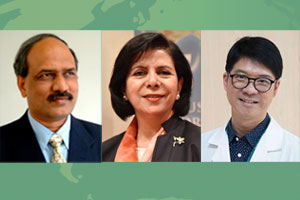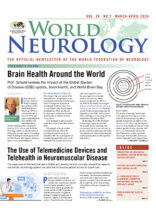This column highlights the WFN committees and specialty groups that raise awareness and carry information on the important contribution of these groups for the functioning of the WFN.
By Chandrashekhar Meshram, Surat Tanprawate, and Serefnur Ozturk

Chandrashekhar Meshram, Serefnur Ozturk, and Surat Tanprawate.
The committees of the WFN contribute immensely to the functioning of the WFN. The chairs are appointed by the trustees. The present composition and membership can be seen on the WFN website.
The committees work on specific issues while the specialty groups focus on specific neurological conditions.
Information about the Publication Committee and the history of Neurosciences Specialty Group was published in the last issue of World Neurology.
In this issue, Information about the e-Communications & e-Learning Committee and the Migrant Neurology Specialty Group is published. Dr. Surat Tanprawate, who is the chair of e-Communications & e-Learning Committee, which comes under the broad category of education, has summarized the information about this committee. Dr. Serefnur Ozturk, the chair of the Migrant Neurology Specialty Group, has provided the information about this group.
e-Communications & e-Learning Committee
The e-Communications & e-Learning Committee occupies a critical position in advancing neurology education and communication worldwide. Through strategic consolidation of three subcommittees and targeted efforts, the committee has become a driving force in streamlining activities to enhance visibility, disseminate knowledge, and foster collaboration across electronic media platforms. Initiatives such as website enhancements, social media management, and the establishment of an e-Learning Hub have significantly extended the WFN’s reach and influence within the neurology community. Past-Chair Walter Struhal spent a lot of effort to streamline this committee.
The official website of the WFN serves as a central repository for neurology professionals and the general public worldwide. It offers a comprehensive array of resources, including educational materials, networking opportunities, advocacy initiatives, information on WFN programs, and multilingual support. This platform facilitates collaboration and drives the advancement of neurological care across borders.
In today’s digital landscape, the role of an e-Communications Committee dedicated to managing social media cannot be overstated. In conjunction with website enhancements, the WFN has harnessed the potential of social media platforms such as X (previously Twitter), Facebook, and LinkedIn to broaden its reach and deepen engagement. This proactive approach has made the organization’s initiatives and resources more accessible to stakeholders worldwide.
At the heart of the committee’s mission lies the e-Learning Hub, conceived by Morris Freedman, a distinguished committee member. The e-Learning Hub serves as a centralized repository of high-quality educational activities, including rounds, seminars, webinars, master classes, conferences, and special lectures. Leveraging the internet’s capabilities, the hub ensures convenient access to educational resources for neurologists worldwide, irrespective of their career stage.
Through close collaboration with regional societies, the committee coordinates Educational Days and e-Learning events tailored to specific neurology subfields and regional contexts. A recent milestone in this collaborative effort is the fourth WFN-AFAN E-Learning Day, focusing on neuropathies. This online event also offers on-demand videos for participants, ensuring accessibility and flexibility in learning.
World Brain Day 2024, scheduled for July 22, 2024, underscores the importance of brain health and prevention, spearheaded by WFN. The e-Communication Committee plays a pivotal role in raising awareness and fostering engagement through digital platforms. By leveraging these channels, the committee ensures global outreach and impact, amplifying the message of brain health and prevention to diverse audiences worldwide.
Through strategic initiatives, collaborative efforts, and innovative approaches, the committee continues to play a pivotal role in advancing neurological care and shaping the future of the field.
Migrant Neurology Specialty Group
Migration is a historically old and increasing social, economic, and beyond that, public health problem. The Migrant Neurology Specialty Group was formed Dec. 18, 2018, in Marrakech, Morocco, during the 12th Maghreb Congress of Neurology. Its aim was to attract the attention of neurologists worldwide and health policymakers in the host countries, on the particularity of the neurological disorders in the migrant population. Most human migration is in search of better opportunities, reflecting the desire for an improved quality of life. The current international migration is a reflection of the world, resulting from the dynamics generated by changes in political, economic, and cultural and environmental climate-related structures. Refugees are at significantly higher risk of experiencing disability associated with neurological conditions. Services and care pathways, including access to quality emergency care, should be responsive to the needs of all people with neurological disorders, not least those who are already vulnerable, such as refugees.
Studies on the health of migrants show that migrants have more health problems than the hosting populations. They are more vulnerable to communicable diseases, but also to some non-communicable diseases, such as stroke, hypertension, diabetes mellitus, or obesity. The high prevalence of neurological diseases in low- and middle-income countries, where the majority of migrants are originating, a high frequency of diseases of the nervous system should be expected among migrants. However, the incidence, prevalence, and clinical presentation of neurological diseases may differ in migrant people depending on the epidemiology, geography, and genetic background of the native country.
Stroke is a major public health problem among migrants given the high prevalence of vascular risk factors such as hypertension, diabetes mellitus, obesity, and smoking. Dementia, multiple sclerosis, neuroinfectious diseases, and functional disorders are common and important problems among migrants. The WFN Migrant Neurology Specialty Group plans more meetings dedicated to other neurological diseases in migrant people, such as cognitive disorders in elderly migrants, epilepsy, neurogenetics, migraines and headaches, neuromuscular diseases, movement disorders, anxiety, and depression.
The group has a strong collaboration with WFN for refugees as “Brain Health for All on World Refugee Day” to ensure the equitable access to resources, treatment, and rehabilitation that is essential for brain health to all refugees. The interesting book “Neurology in Migrants and Refugees” book was published in 2021. The charter of the global alliance was adopted by the U.N. General Assembly on Dec. 19, 2018, and this constitutes real progress for the cause of migrant people. Past-Chairs Mustapha El Alaoui Faris and Antonio Federico made significant efforts to establish and streamline the activities of this group. •
Chandrashekhar Meshram is co-opted trustee of the WFN. Dr. Surat Tanprawate is the chair of e-Communications & e-Learning Committee. Dr. Serefnur Ozturk is the chair of the Migrant Neurology Specialty Group.
